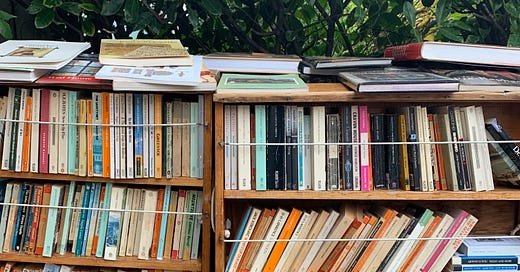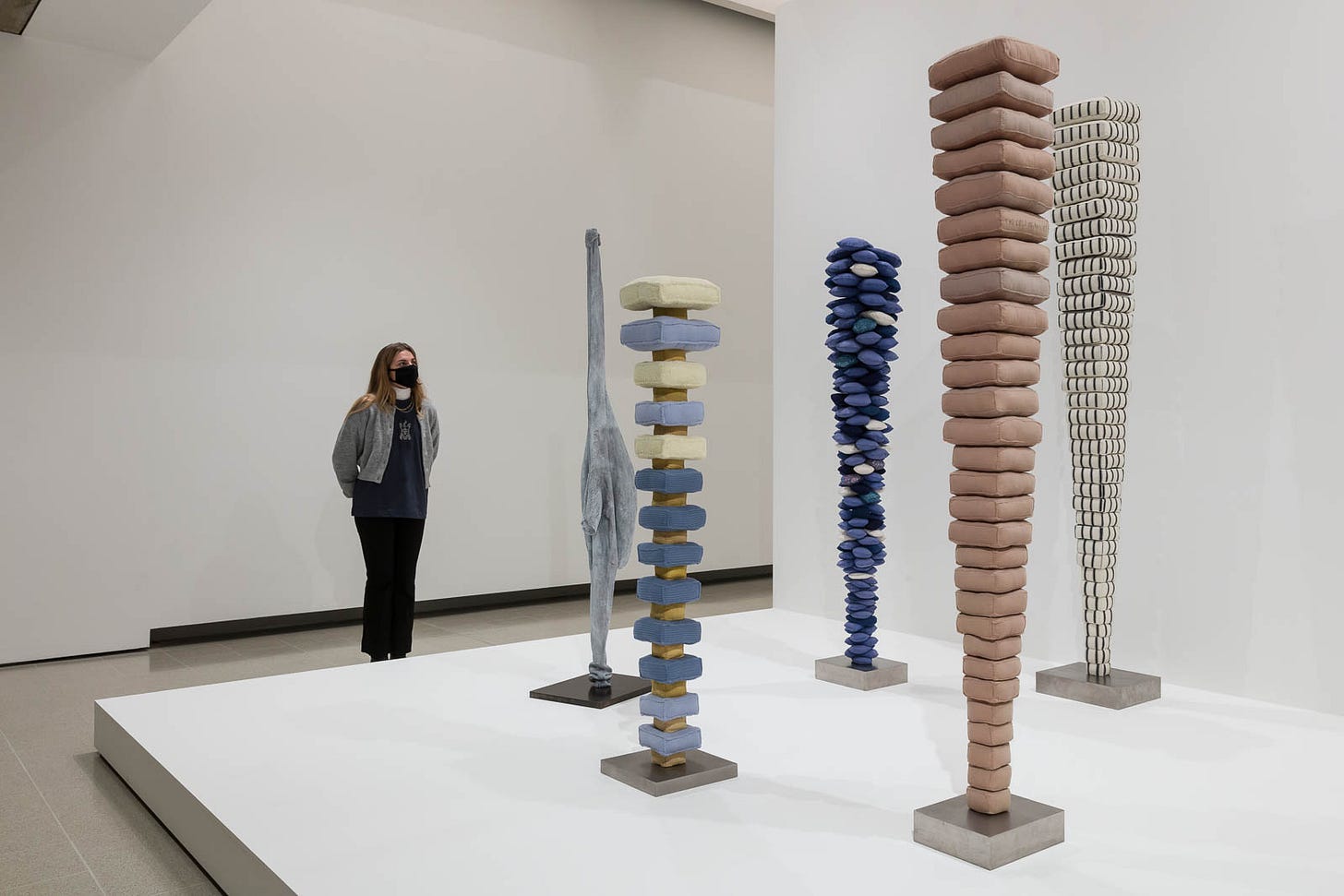“I remember waking at a certain point and feeling as if the four walls of books around me were like my very own Egyptian tomb; that I was, in a sense, already dead. So many collected and archived things snug in their designated places. Not so much a space for dreaming or reverie as one limned by regret, curdled concupiscence, and, increasingly, Niagaras of sudden unexpected tears. A librarian of my own timidity, withdrawal and discontent." - Ian Penman, Fassbinder: Thousands of MirrorsI can’t stop buying books.
Patrick White, Jean Genet, Le Guin, Rilke, Deleuze and Guattari, Woolf, Hesse, Didion, Nietzsche, Murnane, Hobsbawm, Auden, Lorde, Ferrante, Proust, Grass, Sontag, Brecht, Can Xue, Foucault, Nabokov, Sexton, Baldwin, Calvino. I scour the internet, op shops and secondhand bookstores, creating piles ever higher in my living room and on my bedroom floor. I turn down offers to borrow books and avoid the library to triumph over what is mine permanently, the possession greater than the story it offers inside.
Each purchase begets, even compels the next. As if the next one will fix me, as if the next one will save me. But I can never be satisfied. No, like any twisted consumption logic, the more I buy the further I am from contentment. Ferocious appetite is hollowing out the joy of the item and quickly turning it to frenzy for the next. The urge is beginning to border on pathology - it is clear that something else is driving it.
I offer several hypotheses for the book buying compulsion.
*
Book browsing brings with it distinct pleasures. The physicality of the book complements the spiritual essence of its words. Books are tactile - the spine is hard but giving, the pages soft and fragile. The bookstore ritual is a favourite pastime. Standing in front of a shelf, head tilted to the right to consider the titles, I’ll pull out a book that has piqued my interest for closer inspection, returning on second thought. The experience is amplified in a secondhand bookstore, where the past lives of the books elicit a certain spiritual quality in addition to a smell and feel. People squeeze past precarious piles, thumbing open the pages to the price scribbled in the front. Treasures lurk between the tat.
Bringing a book home brings a second form of pleasure - the idea of a collection. This is a true scholarly pleasure, a librarian’s joy, to be found in the cataloguing of the collection. It has a simple quality too, like a child stacking rings onto a peg. In Walter Benjamin’s essay Unpacking My Library, “every passion borders on the chaotic, but the collector’s passion borders on the chaos of memories”. I posit instead that the collector’s passion is driven by an urge to dispell the chaos around us. The indexing, ordering, listing, arranging and re-arranging brings with it immense satisfaction, one that hints at a delusion that you can somehow control your environment and the world around you. This is book buying as a means of ordering chaos.
Books stack - literally, they pile on top of one another, they can be slipped in and out of others of a similar height, theme or tone. They also stack metaphorically in a way that few other things do - they are amplified by their neighbours on the shelf. They are categorical - fiction, non fiction, poetry, plays, coffee table books, cookbooks, art books, textbooks, each of these categories holding multiple categories within them. How many times I have arranged, rearranged, then re-rearranged on a whim.
For French-American artist Louise Bourgeois, “art is a guarantee of sanity”. Bourgeois explored the idea throughout her multidisciplinary career, notably in her drawings and sculptural forms. “It was the controlling of chaos by one of us” a drawing in her 2002 series Sublimation reads. The work tells the story of tension, resolution and trauma in a family environment, in which a simple “symbolic act” (cleaning with a broom) worked to dispel the chaos of an argument between parents.
Louise Bourgeois’ fabric sculptures
Her fabric sculptures, themselves symbolic acts, are another way that Bourgeois attempted to control the chaos of her environment. Her cushioned shapes are piled on top of one another, often in an inverted pyramid structure, perhaps reminiscent of a pile of books.
Socioeconomic conditions may be increasing urges to seek comfort and safety through the ordering and controlling of objects. The world is a dangerous and lonely place. Hoarding is on the rise - a more extreme form of consumption compulsion but one that is seeking to make sense of the same chaos. In this sense, book buying, or really book collecting, has a clear logic. And so part of the picture comes into focus.
**
I am reminded of the symbiotic relationship between selfhood and the world around us to find the next source of my urge. Book buying as a means of being seen.
This is evident in the hope that the purchasing and displaying of the right array of objects will signal something - not just what I am interested in, but what kind of person I am. Books as brand-like signifiers in a performance of aesthetics - an Ottessa Moshfegh here, some Simone Weil there. A frantic consumerist impulse not just to enjoy something but to possess it, to put your name to some small piece of it. The object as the mirror to one’s ideal self. As in Gary Indiana’s Horse Crazy, “people yearn to own all the products of the inner life, as if the inner life were comparable in value to their chairs and sofas and dining room tables”.
This is Debord’s society of the spectacle, where being was replaced by having, and is now replaced by appearing to have. Like the rumours of Tianjin’s beautiful but illusory Binhai Library, where many of the books are unreadable, books do not need to be read to serve their new purpose. Ceci n'est pas une pipe.
There are many avenues for the performance of readership. There is the literal - we can be seen with a book under our arm or looking at something thought provoking on the train. As with any micro decision we make about our appearance, behaviours or actions, it is about what can be said without words. Does this Mark Fisher say what I want it to? Will the right people see it, get it? And when we play audience, what do certain books in the hands of others tell us in return?
See: Instagram account hot dudes reading. See also: cyclical Twitter discourse on the performance/authenticity of reading a book at a bar.
The internet has revolutionised metaphysical ways to be seen. Apps like Letterboxd, IMDb and Last.fm have exploded in popularity in recent years as exercises in social cataloging. In the midst of ever expanding chaos masquerading as consumer choice, these apps offer users an attempt at organising the chaos. And yet the social function introduces the element of performance. The premier booklogging site Goodreads enables you to befriend people and engage with their recent book activity. It can also be gamified through the app’s reading challenge function, where users set a public challenge to read a certain number of books in a calendar year. Perversely, friends can track one another’s progress. Annabelle is three books behind schedule. And thus the panopticon triggers its inevitable feedback loop: the hypothetical audience threatens and induces the self conscious adapting of behaviour. Annabelle is on track.
This leads us to Booktok - the TikTok community dedicated to reading. If the internet is the main stage of the performance of aesthetics, then TikTok is the pièce de résistance. A quick search for “booktok” on the app brings up videos of users listing their favourite books, taking the audience on a tour of their bookshelves, sharing relatable habits common to readers and acting out emotional responses to recent reads. Of course much of this may be heartfelt - an outlet for avid readers to connect and share their beloved hobby. And yet engagement is centred on the relational and the performative, what books do to us or say about us, not what they are. As in Barry Pierce’s incredible takedown of Booktok, “the act of reading became replaced by the act of being a reader.” It is this act of being a reader that I have identified in my book buying habit.
***
Finally I have come to recognise a deeper-rooted, fearful impulse. Book buying as an attempt to live forever. I see this in the restless quality of the habit, the urge to acquire the entire literary canon as well as new releases, as if these are achievements to be unlocked. A grasping for knowledge and possession that is an attempt to conquer something. An anxious collecting of memories and experiences, as if we can somehow build a rich enough library that it could stop the inevitable ebb of time. Books are a way of seeing the world after all, of connecting with people and experience and life in all its forms. Another way that we carry out the perpetual search for meaning that sits at the root of our existence.
And even when we acknowledge our books will bury us, perhaps there is the hope that they can serve as a reminder of the lives that we led. A stranger in the future coming across my name and the date of purchase in the inside cover someday, like lovers’ carvings on a tree. Something to show we were here.
This is the synthesis, perhaps, of book buying as the controlling of the chaos of life and of being seen.
Just as recognising the problem is only step one, I doubt this exercise will have much impact on my collecting habits. Perhaps a little more intentionality, a little more restraint at the bookstore. Or perhaps I’ll go the other way and fully commit to my role as librarian. Build my life around my tomes, structured around the hopes, fears and dreams they encapsulate. There are worse ways to go broke.





